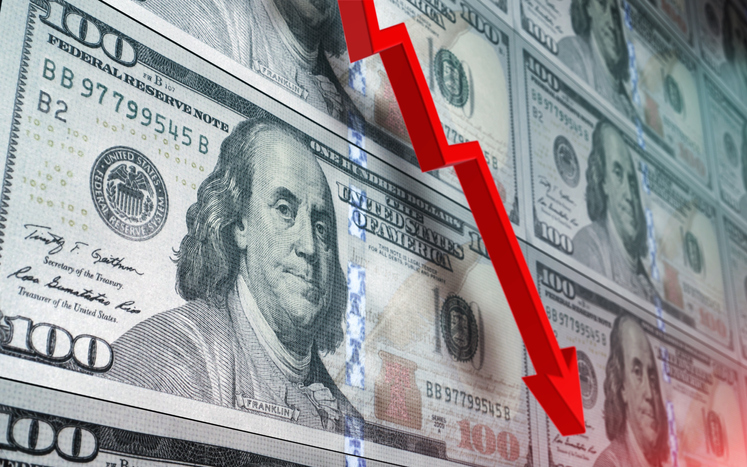Easing concerns surrounding the spread of the delta variant and a generally dovish set of communications from the Federal Reserve sent risk currencies higher and caused the dollar to retrace most of its recent gains last week.
Barring any surprises from the BoE, this Friday’s US payrolls report will probably be the main event risk in the FX market this week. In the meantime, however, we will be keeping a close watch on revised PMI numbers for the Eurozone (Monday and Wednesday) and Tuesday’s Reserve Bank of Australia meeting. The latter is expected to see a U-turn in the recent decision to taper asset purchases.

Loss in American dollar. Red arrow graph is showing a drastic fall over American dollar background. Selective focus. Horizontal composition with copy space.
GBP
The last fortnight has been a rather topsy-turvy one for sterling. The pound fell sharply following ‘Freedom Day’ in the UK, as investors feared that a swift removal of almost all lockdown measures would lead to a surge in infection and a reimposition of measures in the not too distant future. Actually, what we’ve witnessed so far has been the complete opposite, with new caseloads dropping by around a half from their 17th July peak. It is early days, but this is an encouraging sign and one that has allowed sterling to roar back sharply to around a five-week high on the dollar.
As mentioned, we don’t expect too many fireworks from the Bank of England this week. There continues to appear a division among MPC members as to the nature of the recent inflation spike, and with delta concerns also brewing in the background, we may have to wait until the September meeting for any meaningful policy announcements.
EUR
A relatively encouraging set of macroeconomic prints helped lift the euro briefly back above the 1.19 level versus the dollar last week. The second-quarter GDP number surprised to the upside, with growth coming in at 2% quarter-on-quarter versus the 1.5% expected. There was also a larger-than-expected drop in the jobless rate and a sharp increase in German inflation. So far, inflationary pressures in the Euro Area have lagged behind many of the bloc’s G10 peers, but it will be interesting to see how the so-far dovish ECB reacts should this pick-up in prices prove both widespread and sustained.
Revised Eurozone PMI data for this week is probably unlikely to rock the boat, so we may see the euro trade off events elsewhere, namely Friday’s US payrolls report.
USD
Last week’s FOMC meeting sent the dollar sharply lower against almost all of its peers, with the dollar index back trading around a one-month low this morning. Powell didn’t appear particularly concerned with the recent spread of the delta variant. He noted that the economic implications had tended to be less with each successive wave of the virus and that it was reasonable to assume that would be the case this time around. He also downplayed the impact of rising US inflation. In our view, this insistence that the recent spike in inflation will be transitory makes it unlikely that we’ll get news on tapering at the August Jackson Hole conference. We may instead have to wait until the September FOMC meeting.
In the meantime, this Friday’s payrolls report will be key for the dollar. It seems that the market has relatively lofty expectations, so risks to the USD may be skewed to the downside.
🎧 Listen to our latest FX Talk episode: “Emerging market currencies wobble as Delta spreads”